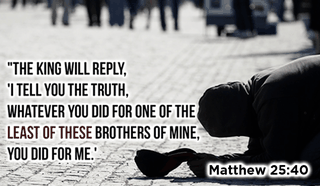
- Recent Translations
- All Translations
Matthew 25 Commentary
Chapter 25
The parable of the ten virgins. (1-13) The parable of the talents. (14-30) The judgment. (31-46)
Verses 1-13 The circumstances of the parable of the ten virgins were taken from the marriage customs among the Jews, and explain the great day of Christ's coming. See the nature of Christianity. As Christians we profess to attend upon Christ, to honour him, also to be waiting for his coming. Sincere Christians are the wise virgins, and hypocrites the foolish ones. Those are the truly wise or foolish that are so in the affairs of their souls. Many have a lamp of profession in their hands, but have not, in their hearts, sound knowledge and settled resolution, which are needed to carry them through the services and trials of the present state. Their hearts are not stored with holy dispositions, by the new-creating Spirit of God. Our light must shine before men in good works; but this is not likely to be long done, unless there is a fixed, active principle in the heart, of faith in Christ, and love to God and our brethren. They all slumbered and slept. The delay represents the space between the real or apparent conversion of these professors, and the coming of Christ, to take them away by death, or to judge the world. But though Christ tarry past our time, he will not tarry past the due time. The wise virgins kept their lamps burning, but they did not keep themselves awake. Too many real Christians grow remiss, and one degree of carelessness makes way for another. Those that allow themselves to slumber, will scarcely keep from sleeping; therefore dread the beginning of spiritual decays. A startling summons was given. Go ye forth to meet Him, is a call to those prepared. The notice of Christ's approach, and the call to meet him, will awaken. Even those best prepared for death ( 2 Peter. 3:14 ) day of search and inquiry; and it concerns us to think how we shall then be found. Some wanted oil to supply their lamps when going out. Those that take up short of true grace, will certainly find the want of it one time or other. An outward profession may light a man along this world, but the damps of the valley of the shadow of death will put out such a light. Those who care not to live the life, yet would die the death of the righteous. But those that would be saved, must have grace of their own; and those that have most grace, have none to spare. The best need more from Christ. And while the poor alarmed soul addresses itself, upon a sick-bed, to repentance and prayer, in awful confusion, death comes, judgment comes, the work is undone, and the poor sinner is undone for ever. This comes of having oil to buy when we should burn it, grace to get when we should use it. Those, and those only, shall go to heaven hereafter, that are made ready for heaven here. The suddenness of death and of Christ's coming to us then, will not hinder our happiness, if we have been prepared. The door was shut. Many will seek admission into heaven when it is too late. The vain confidence of hypocrites will carry them far in expectations of happiness. The unexpected summons of death may alarm the Christian; but, proceeding without delay to trim his lamp, his graces often shine more bright; while the mere professor's conduct shows that his lamp is going out. Watch therefore, attend to the business of your souls. Be in the fear of the Lord all the day long.
Verses 14-30 Christ keeps no servants to be idle: they have received their all from him, and have nothing they can call their own but sin. Our receiving from Christ is in order to our working for him. The manifestation of the Spirit is given to every man to profit withal. The day of account comes at last. We must all be reckoned with as to what good we have got to our own souls, and have done to others, by the advantages we have enjoyed. It is not meant that the improving of natural powers can entitle a man to Divine grace. It is the real Christian's liberty and privilege to be employed as his Redeemer's servant, in promoting his glory, and the good of his people: the love of Christ constrains him to live no longer to himself, but to Him that died for him, and rose again. Those who think it impossible to please God, and in vain to serve him, will do nothing to purpose in religion. They complain that He requires of them more than they are capable of, and punishes them for what they cannot help. Whatever they may pretend, the fact is, they dislike the character and work of the Lord. The slothful servant is sentenced to be deprived of his talent. This may be applied to the blessings of this life; but rather to the means of grace. Those who know not the day of their visitation, shall have the things that belong to their peace hid from their eyes. His doom is, to be cast into outer darkness. It is a usual way of expressing the miseries of the damned in hell. Here, as in what was said to the faithful servants, our Saviour goes out of the parable into the thing intended by it, and this serves as a key to the whole. Let us not envy sinners, or covet any of their perishing possessions.
Verses 31-46 This is a description of the last judgment. It is as an explanation of the former parables. There is a judgment to come, in which every man shall be sentenced to a state of everlasting happiness, or misery. Christ shall come, not only in the glory of his Father, but in his own glory, as Mediator. The wicked and godly here dwell together, in the same cities, churches, families, and are not always to be known the one from the other; such are the weaknesses of saints, such the hypocrisies of sinners; and death takes both: but in that day they will be parted for ever. Jesus Christ is the great Shepherd; he will shortly distinguish between those that are his, and those that are not. All other distinctions will be done away; but the great one between saints and sinners, holy and unholy, will remain for ever. The happiness the saints shall possess is very great. It is a kingdom; the most valuable possession on earth; yet this is but a faint resemblance of the blessed state of the saints in heaven. It is a kingdom prepared. The Father provided it for them in the greatness of his wisdom and power; the Son purchased it for them; and the blessed Spirit, in preparing them for the kingdom, is preparing it for them. It is prepared for them: it is in all points adapted to the new nature of a sanctified soul. It is prepared from the foundation of the world. This happiness was for the saints, and they for it, from all eternity. They shall come and inherit it. What we inherit is not got by ourselves. It is God that makes heirs of heaven. We are not to suppose that acts of bounty will entitle to eternal happiness. Good works done for God's sake, through Jesus Christ, are here noticed as marking the character of believers made holy by the Spirit of Christ, and as the effects of grace bestowed on those who do them. The wicked in this world were often called to come to Christ for life and rest, but they turned from his calls; and justly are those bid to depart from Christ, that would not come to him. Condemned sinners will in vain offer excuses. The punishment of the wicked will be an everlasting punishment; their state cannot be altered. Thus life and death, good and evil, the blessing and the curse, are set before us, that we may choose our way, and as our way so shall our end be.

